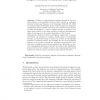38 search results - page 4 / 8 » Computationally sound analysis of protocols using bilinear p... |
CCS
2008
ACM
13 years 9 months ago
2008
ACM
Multisignatures allow n signers to produce a short joint signature on a single message. Multisignatures were achieved in the plain model with a non-interactive protocol in groups ...
TCC
2005
Springer
14 years 1 months ago
2005
Springer
Abstract. We prove a computational soundness theorem for the symbolic analysis of cryptographic protocols which extends an analogous theorem of Abadi and Rogaway (J. of Cryptology ...
SCN
2010
Springer
13 years 6 months ago
2010
Springer
An identity-based encryption (IBE) scheme can greatly reduce the complexity of sending encrypted messages. However, an IBE scheme necessarily requires a private-key generator (PKG)...
EUROCRYPT
2009
Springer
14 years 8 months ago
2009
Springer
A group key agreement (GKA) protocol allows a set of users to establish a common secret via open networks. Observing that a major goal of GKAs for most applications is to establish...
ASIAN
2007
Springer
14 years 1 months ago
2007
Springer
Abstract. This paper is concerned about relating formal and computational models of cryptography in case of active adversaries when formal security analysis is done with first ord...

